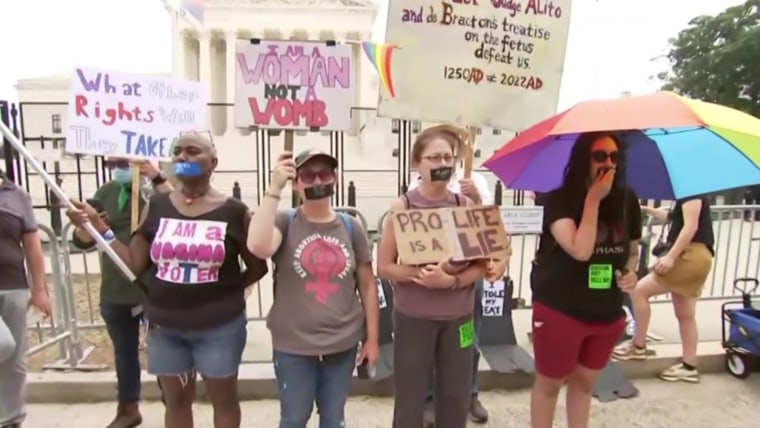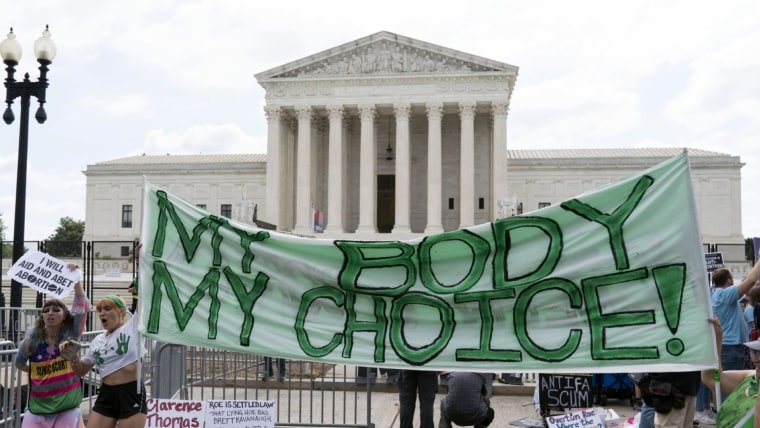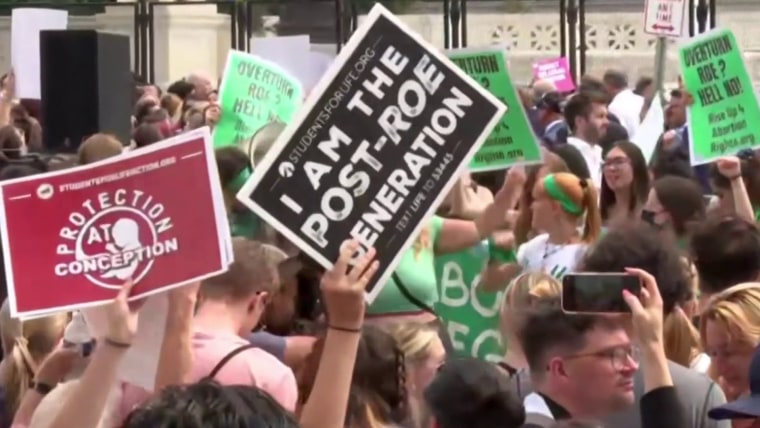WASHINGTON — The Supreme Court on Friday overturned the landmark Roe v. Wade ruling that guaranteed a constitutional right to an abortion, a momentous break from a half-century of rulings on one of the nation’s most controversial issues. About half the states have already indicated they would move to ban the procedure.
Supporters of abortion rights were bracing for the loss after an early draft of the opinion was leaked in May, touching off several days of demonstrations in more than two dozen cities. Protesters even showed up outside the homes of some members of the court.
Alarmed by the prospect that Roe would be overturned, Democrats in Congress responded to the leak by holding a Senate vote to advance legislation that would guarantee access to abortion nationwide. The bill was blocked, however, in a largely party-line vote.
The court ruled 6-3 to uphold the Mississippi law and 5-4 to overturn Roe. In the majority opinion, Justice Samuel Alito wrote that the court’s decision in Roe “sparked a national controversy that has embittered our political culture for a half century.”
“We hold that Roe and Casey must be overruled. The Constitution makes no reference to abortion, and no such right is implicitly protected by any constitutional provision, including the one on which the defenders of Roe and Casey now chiefly rely — the Due Process Clause of the Fourteenth Amendment,” Alito wrote in the majority opinion, which was backed by Justices Clarence Thomas, Neil Gorsuch, Brett Kavanaugh and Amy Coney Barrett.
“It is time to heed the Constitution and return the issue of abortion to the people’s elected representatives,” he wrote.
In a concurring opinion, Kavanaugh noted that states retained the power to limit or grant the right to an abortion.
“After today’s decision, all of the States may evaluate the competing interests and decide how to address this consequential issue,” he wrote.
Thomas, meanwhile, called on the court to revisit other past decisions, including on contraception and same-sex marriage, in his opinion concurring with the majority ruling. He wrote that he would do away with the doctrine of “substantive due process” and explicitly called on the court to overrule the rulings in Griswold v. Connecticut, on the right to contraception; Lawrence v. Texas, on the right to same-sex intimacy; and Obergefell v. Hodges, on the right to same-sex marriage.
“As I have previously explained, ‘substantive due process’ is an oxymoron that ‘lack[s] any basis in the Constitution,’” he wrote.
Chief Justice John Roberts joined the other conservative justices in the decision to uphold the underlying Mississippi law that was being challenged in the case, but he urged in a concurring opinion against going further.
“Surely we should adhere closely to principles of judicial restraint here, where the broader path the Court chooses entails repudiating a constitutional right we have not only previously recognized, but also expressly reaffirmed applying the doctrine of stare decisis,” Roberts wrote.
In a dissent, liberal Justices Stephen Breyer, Elena Kagan and Sonia Sotomayor said the court “reverses course today for one reason and one reason only: because the composition of this Court has changed.”
“Today, the proclivities of individuals rule,” they added. “The Court departs from its obligation to faithfully and impartially apply the law.”
“With sorrow — for this Court, but more, for the many millions of American women who have today lost a fundamental constitutional protection — we dissent,” they concluded.
The court’s ruling does not make abortion illegal, but with access to the procedure no longer deemed a constitutional right, states can now move to ban it.
Lawmakers, Biden administration react
House Speaker Nancy Pelosi, D-Calif., called the ruling “outrageous and heart-wrenching.”
“Today, the Republican-controlled Supreme Court has achieved the GOP’s dark and extreme goal of ripping away women’s right to make their own reproductive health decisions. Because of Donald Trump, Mitch McConnell, the Republican Party and their supermajority on the Supreme Court, American women today have less freedom than their mothers,” Pelosi said.
Senate Majority Leader Chuck Schumer, D-N.Y., said, “Today is one of the darkest days our country has ever seen. Millions upon millions of American women are having their rights taken from them by five unelected Justices on the extremist MAGA court.”
Former President Donald Trump, who nominated three of the judges who voted to overturn Roe, told Fox News, “This is following the Constitution, and giving rights back when they should have been given long ago.”
Asked if he felt he played a role in the decision being reversed, he said, “God made the decision.”
House Minority Leader Kevin McCarthy, R-Calif., praised the court’s action. “Every unborn child is precious, extraordinary, and worthy of protection. I applaud this historic ruling, which will save countless innocent lives,” McCarthy said. “The Court is right to return the power to protect the unborn to the people’s elected representatives in Congress and the states.”
Senate Minority Leader Mitch McConnell, the Kentucky Republican who reshaped the balance of the court by refusing to hold confirmation hearings for then-President Barack Obama’s Supreme Court nominee and who later rushed Trump’s nomination of Barrett, hailed the ruling as “courageous and correct. This is an historic victory for the Constitution and for the most vulnerable in our society.”
Attorney General Merrick Garland, the Obama Supreme Court nominee snubbed by McConnell, said the Justice Department “strongly disagrees with the Court’s decision. This decision deals a devastating blow to reproductive freedom in the United States. It will have an immediate and irreversible impact on the lives of people across the country.”
Legal scholars said the decision to overrule Roe is one of the few times the Supreme Court has ever invalidated an earlier decision that declared a constitutional right — and the only time it took away a right that had considerable public support.
For abortion opponents who have fought Roe for decades, the court’s decision was a huge victory. But it was a bitter defeat for advocates of abortion rights, who struggled to maintain them while courts narrowed their application over the past five decades.
Alexis McGill Johnson, president of the Planned Parenthood Action Fund, said, “Knowing this moment would come does not make it any less devastating. The Supreme Court has now officially given politicians permission to control what we do with our bodies, deciding that we can no longer be trusted to determine the course for our own lives.”
The ruling came in a dispute over a 2018 law passed by Mississippi’s Republican-controlled Legislature to ban abortions after 15 weeks. The law, which made exceptions for medical emergencies or cases of severe fetal abnormality but not for rape or incest, was immediately challenged and put on hold by lower courts.
Supporters said the measure was intended to regulate “inhumane procedures” and argued that a fetus is capable of detecting and responding to pain by that point in a pregnancy.
Mississippi’s law constituted a direct attack on the court’s landmark 1973 Roe v. Wade decision as well as a follow-on ruling in 1992, Planned Parenthood v. Casey. Under those decisions, states could impose some restrictions on abortion before viability provided they did not constitute an “undue burden” on the right of access to the procedure. But flat-out bans before viability, generally considered to be about 24 weeks into a pregnancy, were deemed to be unconstitutional.
Those rulings are no longer the law of the land, and one reason is the court’s changed composition. Two members of the court who joined in its earlier abortion decisions, Ruth Bader Ginsburg and Anthony Kennedy, were succeeded by justices appointed by Trump: Barrett and Kavanaugh. Trump had declared that he would put “pro-life justices on the court.”
In a statement Friday, Sen. Joe Manchin, D-W.V., said he was “deeply disappointed” by the ruling and singled out Kavanaugh and Gorsuch for voting to overturn Roe. Manchin had voted to confirm both.
“I trusted Justice Gorsuch and Justice Kavanaugh when they testified under oath that they also believed Roe v. Wade was settled legal precedent and I am alarmed they chose to reject the stability the ruling has provided for two generations of Americans,” Manchin said.
He said while he considers himself pro-life, “I support legislation that would codify the rights Roe v. Wade previously protected. I am hopeful Democrats and Republicans will come together to put forward a piece of legislation that would do just that.”
In response to the ruling, the Senate Judiciary Committee tweeted that it “will hold a hearing next month to explore the grim reality of a post-Roe America.”
The Center for Reproductive Rights had urged the court to maintain its earlier abortion rulings that upheld a right of access to abortion.
“Two generations have now relied on this right, and 1 out of every 4 women makes a decision to end a pregnancy,” Julie Rikelman, a lawyer for the group, told the justices.
Lawyers for Mississippi, however, said the law would have a minimal impact on women in the state because its only abortion clinic does not perform the procedure after 16 weeks. More than 90 percent of abortions take place before or during the 13th week of pregnancy, they said.
The court’s decision was the second ruling this term limiting access to abortion. In December, the court allowed a Texas law to remain in force while lower court challenges are underway. The law effectively bans abortion after six weeks of pregnancy by authorizing lawsuits against abortion providers or anyone who assists them.
Its unorthodox method of enforcement was intended to get around the Supreme Court’s earlier abortion rulings that prevented states from simply banning abortion directly. But last June, Gov. Greg Abbott signed a law that would ban abortion in the state within 30 days after a ruling striking down Roe.
In about half the country, abortion is soon likely to be illegal. Texas is one of about two dozen states that were considered certain or likely to ban abortion once the Supreme Court’s abortion precedents were overturned. Thirteen of those states already have measures known as trigger laws, intended to take effect when Roe was overturned or shortly after.
But abortion will remain legal in the other half of the nation, including in such populous states as California, New York, Illinois, New Jersey, and Pennsylvania.













Recent Comments